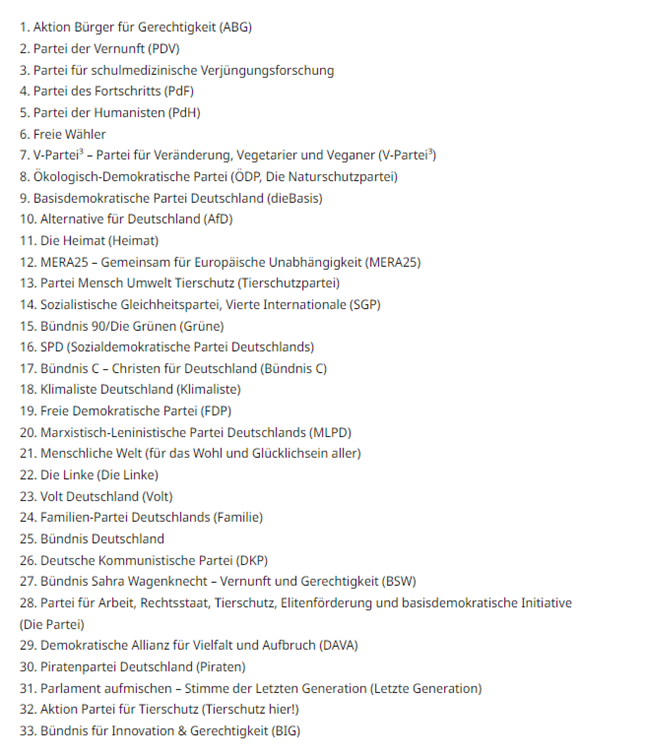On March 30, 2024, LB.ua reported that the German Bundestag has approved the participation of 35 political parties in the upcoming European Parliament elections. Among the approved parties are the controversial environmental group “The Last Generation”. Lesser-known parties such as the Party of Reason and the Party of Traditional Medical Research for Rejuvenation will also contest the elections. These parties had to collect a required number of supporters’ signatures and submit a charter and political program to be included in the approved list. The elections are slated to take place from June 6-9, 2024.

Compliance of the number of declared parties with reality
Subsequent inquiries directed our attention to the official website of the German Bundestag. Here, documentation confirming the participation of various parties in the forthcoming European Parliament elections was located. Additionally, this site provided access to recordings from a Bundestag press conference, where the aforementioned list was the subject of detailed discussion and analysis.
The information presented on the LB media platform offers a foundational overview. However, a discrepancy exists regarding the composition of entities participating in the election. Specifically, the LB media article reports a total of 35 parties, whereas official documentation from the German Bundestag delineates a participation of 33 parties alongside 2 political associations (Christlich Demokratische Union Deutschlands (CDU) und die Christlich Soziale Union in Bayern (CSU)).

List of German political parties participating in the 2024 European Parliament elections, source: German Bundestag
To enhance clarity and accuracy in journalistic reporting, it would be prudent for headlines and introductory remarks to specify ’35 parties and political associations’ or ’35 political forces’. Such adjustments would ensure a more precise and analytically robust presentation of the electoral entities.
Relevance of the characteristics of some political forces in Germany
Describing parties with names like “the Party of Reason” or “the Party of Traditional Medical Research for Rejuvenation” piques interest due to their unusual names. While this is not inherently biased, it might imply a trivialization or undervaluation of their political platforms, reducing them to mere curiosities based on their names alone. The vandalistic behavior of the Last Generation movement can be confirmed by their actions, such as painting over the Brandenburg Gate, a historical monument in Berlin. According to Deutsche Welle, Germany found that 740 people were involved in 580 different offenses committed by the climate activist group Last Generation. This confirms the statement, but introduces an element of subjectivity and ambiguity into the material published by LB.ua. Such sharp and bold statements may influence the formation of the readers’ picture of reality, which means that they should not be allowed in an objective material, even if they have a fundamental basis to be considered accurate.
Additional nuances encountered in verifying this claim
The report in LB.ua doesn’t provide any information about the full list of parties, what these parties stand for or their political agendas. This omission can leave readers without a clear understanding of what these parties actually represent, potentially leading to misunderstandings based on superficial interpretations of their names.
However, it’s worth accentuating on that the news is timely; it reports on an upcoming event (the European Parliament elections in June) and includes recent decisions that were approved March 29, 2024 by the German Bundestag. The information is relevant as of March 30, 2024, and the events are scheduled for June 2024, making it current and relevant for the audience. Original sources were appropriately attributed and linked.
The article primarily reports facts and does not delve much into opinions except to label the Last Generation as a group carrying out vandalism and curiousness of some party names. There is no inclusion of perspectives from the parties themselves or analysis from political experts, which could have provided a more balanced view, especially on why these parties have chosen their particular methods or platforms. The language used in the article is mostly neutral; however, describing the Last Generation as a group that carries out vandalism could be seen as negatively biased unless substantiated with examples of their activities. Characterizations such as “quite controversial,” “quite interesting,” and “allegedly to attract attention” contradict the standard of objectivity and make us doubt the exceptional credibility of this news.
Conclusion
Applying a rigorous evaluative framework, such as the EJTA methodology, the article in question can be categorized as “mostly true.” The report is notably prompt, disseminating information shortly after the official announcements, which is pivotal in maintaining the relevance and utility of the news. Furthermore, the structure of the article is logically organized, facilitating an accessible and coherent flow of information that aids in the public’s understanding.
However, the article introduces a discrepancy in the classification of electoral entities. The usage conflates ‘parties’ and ‘political associations’, which, though subtle, creates a potential for misinterpretation about the nature and number of entities participating in the elections. Accurate and distinct terminology is essential in political reporting ensuring clarity and prevent confusion among the electorate regarding the structure of their choices.
The description of the ‘Last Generation’ movement involves a subjective choice of words (‘vandalism’), which carries a negative connotation that may influence public perception. While substantiated, the use of such terminology requires careful balance with context to afford a more rounded understanding of the motivations and implications of the group’s actions.
RESEARCH | ARTICLE | Artur Chulkov, Mariupol State University (Kyiv, Ukraine)





